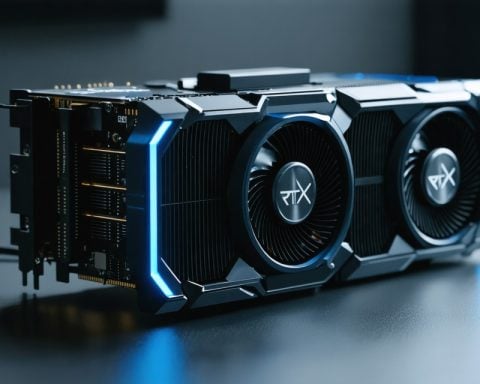Nvidia Shares Slip Amid Rising Concerns
Nvidia’s stock experienced a 2.5% decline on Friday, sending ripples of anxiety through the tech sector. While at first glance it seemed like profit-taking, deeper valuation concerns were at play following Nvidia’s impressive gains earlier this year. As the tech industry faces increasing scrutiny, investors appear wary of current stock prices.
Regulatory and Geopolitical Challenges Loom
Nvidia faces potential hurdles as the U.S. government considers export restrictions on high-performance chips to China, a crucial growth market for the company. Despite the absence of official regulatory news, geopolitical tensions are casting a shadow on investor confidence, reflecting the ongoing complexities of international trade.
Competitive Pressures in the AI Arena
As Nvidia contends with these external risks, it also faces stiff competition in the artificial intelligence chip market. With rivals eager to capture more market share, analysts are contemplating whether Nvidia can maintain its lead amid such challenges.
Balancing Optimism and Risks
Despite these obstacles, Nvidia’s trading volumes suggest a potential short-term blip rather than a prolonged downturn. Investors are caught between optimism for Nvidia’s prowess in AI and semiconductors and caution over valuation, regulatory hurdles, and heightened competition.
With factors like market dynamics and strategic positioning in play, Nvidia’s stock performance shows the fragile equilibrium of triumphs and trials gripping the tech giant.
Unveiling Nvidia’s Challenges: Will the Giant Prevail Amid Trials?
Insights into Nvidia’s Current Landscape
The tech industry is closely monitoring Nvidia as it navigates a challenging environment marked by stock fluctuations, regulatory hurdles, and rising competition. The recent 2.5% dip in Nvidia’s stock has intensified discussions around its future. As a prominent player in the AI chip market, Nvidia’s agility in responding to market dynamics will be crucial.
Competitive Pressures in the AI Arena
Nvidia is renowned for its leadership in AI processors, but the growing competition from companies like AMD and Intel has sparked questions about its ability to maintain dominance. Innovations in semiconductors are driving rapid advancements, with startups also entering the fray, aiming to slice into Nvidia’s market share. Nvidia must continue innovating and optimizing its product lineup to stay ahead.
Geopolitical and Regulatory Challenges
Ongoing geopolitical tensions and potential US export restrictions on high-performance chips, particularly to China, add layers of complexity. China represents a significant growth opportunity for Nvidia, and restrictions could impact revenue streams. Companies operating in the AI chip domain need to navigate these regulatory landscapes carefully, balancing international expansion with compliance.
Investor Sentiments and Predictions
Despite challenges, investor interest remains high due to Nvidia’s strong AI capabilities and strategic advancements in the semiconductor field. The stock’s temporary dip could be a natural market correction rather than a long-term decline. Analysts predict that Nvidia’s strategic initiatives and its ability to adapt to regulatory changes will determine its trajectory.
Market Trends and Future Opportunities
The growing demand for AI and machine learning solutions presents Nvidia with robust opportunities. With sectors like automotive and healthcare increasingly adopting AI technologies, Nvidia’s products are likely to see sustained demand. Partnerships and collaborations may offer new avenues for growth and market penetration.
Sustainability and Innovation
Nvidia’s commitment to sustainability is another factor appealing to investors. Innovations in energy-efficient chips demonstrate Nvidia’s responsiveness to environmental concerns, positioning the company favorably amidst global sustainability efforts.
For more insights on Nvidia’s strategies and market analysis, visit the Nvidia website. As Nvidia charts its path forward, its ability to navigate these complex issues will be critical in maintaining its leadership in the tech industry.



















